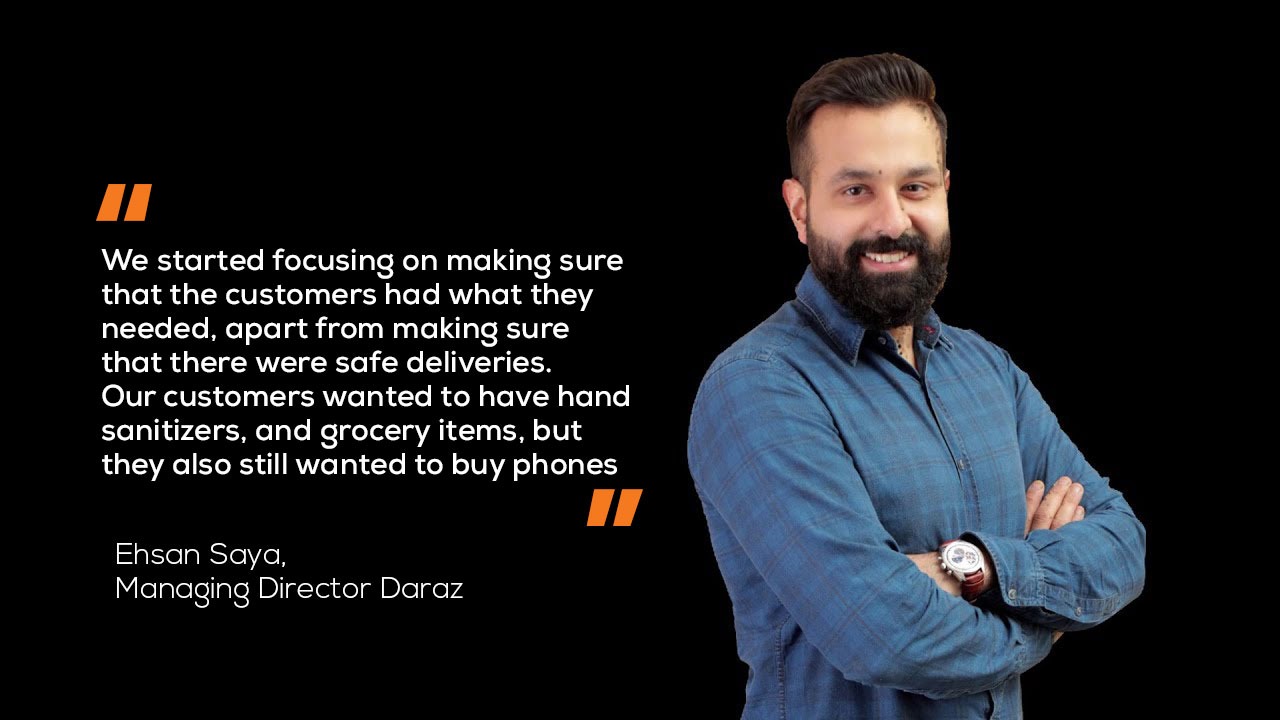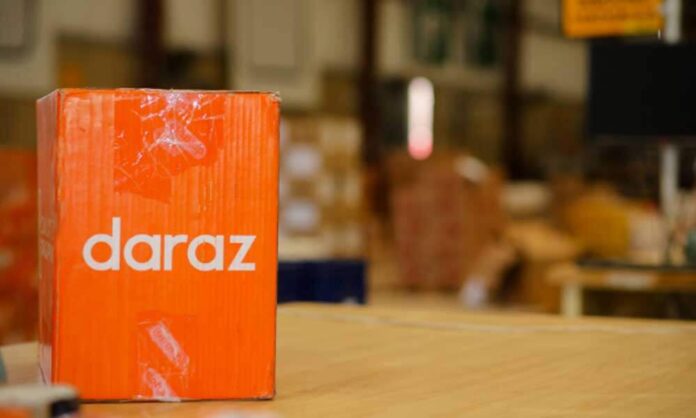As the cases of Covid-19 continue to rise with the advent of the Delta Variant of the virus, and Pakistan along with the rest of the world goes into a fourth (and in some countries fifth) wave of the virus surging, one thing is becoming very clear – we might be in this for the long haul.
When the virus struck last year there seemed initially to be great resolve both among the public, the government and among businesses to stay on track and adapt to the new normal. While the virus hit and knocked out many major companies and unemployment became endemic, there were other businesses that saw a rise in the wake of the virus changing the world we live in.
One of the most obvious cases of businesses seeing more rather than less action because of the pandemic is the eCommerce industry. Some would even say that the situation was tailor made for eCommerce to shine. People were hesitant to go out, and if they were not, lockdowns forced them to stay in. Pakistan has generally been a country where great potential in the eCommerce space has been expected, however, while investments have been rolling in, the public had initially seemed averse to shopping for anything online.
All of those qualms were blown away by the strong persuasive powers of necessity that the pandemic brought on. However, the situation was not as perfect in March 2020 as one might expect. When the pandemic first struck, online marketplaces and eCommerce platforms saw a shockingly sharp rise in demand. Thanks to the disastrous and unexpected nature of the demand increasing, everyone, from providers to consumers of services, were caught unawares.
But as the demand for online deliveries increases, and innovations such as contactless delivery become the new norm, companies are not just ramping up their efforts but actually changing the way they operate and picking issues in their structures and business models. Over the past year, for example, the country’s largest eCommerce retailer, Daraz, has onboarded more than 15,000 new sellers on their platform.
Platforms like Daraz end up not only being able to expand in such times, but also save many businesses from going under which are now relying on eCommerce platforms. With the increase in new sellers wanting to come on board, however, some chink in Daraz’s armour had been exposed in terms of internal inefficiencies. As the Delta Variant continues to rise, there are the chances of another nationwide lockdown. Already Karachi has undergone one, and Lahore and Islamabad are facing the first stage of restrictions that lead to a complete lockdown. Being South Asia’s leading online shopping center, Daraz offers more than 100 categories of 20 million products on the website. Not only is it a virtual marketplace for hundreds of thousands of customers, but it also allows millions of sellers to connect with the world through their products.
If it happens, will eCommerce retailers like Daraz be caught unawares again, or are they this time preparing for what feels like the inevitable? And more importantly, will Daraz be able to woo the seller to come on board their platform? Because at the end of the day, Daraz needs the sellers and the sellers need Daraz for the foreseeable future.
Lockdown impacts
The ongoing digitalization in the retail industry is a process that has been going on for many years. However, the outbreak of the novel disease Covid-19 fastened the digitization process by forcing businesses to adapt to a needed digital way of operating within weeks.

The critical word in this equation is ‘forcing.’ Both businesses and consumers are slow and stubborn in accepting change. Online shopping would have become the norm in Pakistan no matter what, and eCommerce retailers and logistic providers had already been making significant inroads into Pakistan in alliance with the fledgling payments revolution. However, when the pandemic struck, most of these businesses were forced into making online platforms. The problem? Many of these businesses had been running brick-and-mortar stores for generations and had no idea how to go online. It is not as simple as setting up a website, and even that many of these places did not know how to do. This is where eCommerce platforms come in. Our example for this story is Daraz. Back in 2020 when the pandemic had first arrived, one of the first trends online marketplaces observed was that as people began to settle down, they realised that people still wanted non-essential items as well as the more staple purchases like groceries.
“COVID took everyone, including ourselves, a little bit by surprise. And I think for us the important thing was to ensure that first and foremost, the thing that crossed all of our minds as management was to ensure the safety of our customers, our sellers, and our employees,” said Ehsan Saya, managing director of Daraz. “We started focusing on making sure that the customers had what they needed, apart from making sure that there were safe deliveries. Our customers wanted to have hand sanitizers, and grocery items, but they also still wanted to buy phones.”
This is where certain things must have become apparent for Daraz. Yes, the immediate impulse was to provide groceries and covid related products like masks and sanitizers, but as the pandemic continued to stretch longer and longer, it was quite obvious that people wanted to continue to live their lives. Because of this, Daraz has been making leaps and strides to take more sellers on board their platform. This works well both for Daraz and, of course, the sellers in question. To understand why this is so, it is important to understand the nature of the Daraz platforms.
Delta impact
In the last three months, the Delta variant has taken Pakistan and the rest of the world from being on the brink of breaking Covid-19 to once again being close to square one. As a result, we are seeing businesses once again going through much of the same as they did last year. In 2020, Daraz had problems with bringing so many new sellers onto their platform.
Daraz will have been the first to notice the increase in demand since the delta variant has struck. To businesses, the answer may have been less obvious. You see, as many people continue to mistakenly believe, Daraz does not actually sell the products that it lists on its website. It is purely a platform that takes sellers on board and allows them to list their products. After the listing, anyone can look through Daraz, and then Daraz will manage the logistics from payments, to making sure the product gets delivered, to the website design and product placement.
It is very much the same concept as a shopping mall. Shopping malls do not sell products. Shopping malls are real estate companies which lease their property to retailers. These tenants are the ones who are selling products. Products are delivered either by company trucks from a distribution center (for larger chain stores) or possibly by major carriers (FedEx, UPS, etc in places like the US) for smaller businesses. In the same way, Daraz simply provides online real estate for online retailers to list their products. Of course, Daraz has a lot of control like any mall. In a regular mall, not anyone can walk in and set up shop and pay rent. They need to go through a review process and be approved after setting a rate. The same is the case with Daraz, which has a long process to take new sellers on board.
This is a problem, or as Daraz at least would like to claim, was a problem. The process for becoming a seller on Daraz was a long process. To set up as a Daraz seller, you go to www.daraz.pk and click on ‘Sign Up’ on the right-most top corner of the webpage or go to Sell on Daraz. Then, you list all of your products and go through a rigorous process. It was a rather elaborate process to say the least.
To fix some of the hesitance caused by these complications, Daraz has revamped their seller onboarding process for the ease of offline sellers who want to start selling online. Finance Resources and Existing SSU Team have merged and previously lead processing used to be a multistep process where leads used to go from one dept to other with variable accesses to clearing those leads which used to take more time and effort. They have also changed that and now all team members have all access and total ownership of the whole funnel for lead processing. As a result, in the last 3 months, Daraz has boarded more than 15,000 sellers. The increase in sellers has had a direct impact in the increase of assortment.
Why businesses need to catch up
Daraz seems to be doing its best to bring businesses on board. But will it be enough? As the Delta Variant spreads quicker than ever with almost 100% of new cases being reported being from the new variant, the implications of a lockdown on offline markets are dire. Markets have been trying to recover as lockdowns have eased but they must by now realise that more lockdowns and financial hardships are underway. To undercut their losses from these, they must turn towards the internet and either set up their own websites with SEO professionals, sign up to a logistics service, or they need to get on board eCommerce platforms such as Daraz. Anything short of this will be business suicide and this time excuses of being caught off guard will not fly since they had all the time, warning, and precedent in the world to stave this off and try to survive until better days.
If businesses are to sustain themselves, they absolutely must go in with a strategy in which they follow at least a hybrid model of selling both in person and online. With how things are going, it seems that at least for another couple of years – until enough people are inoculated globally – we will be going through a period of lockdowns being implemented and lifted. In the times that lockdowns are lifted, these businesses must hunker down and make the most of them. But they also need to have online presences ready and primed to take on the competition whenever a sudden lockdown is imposed.




